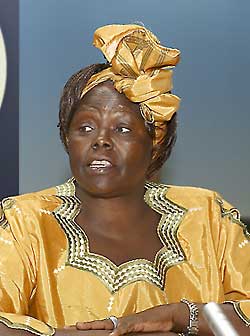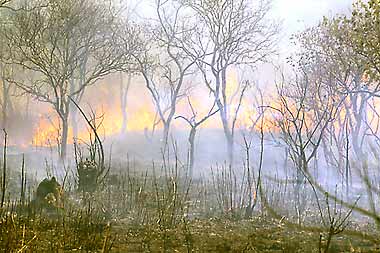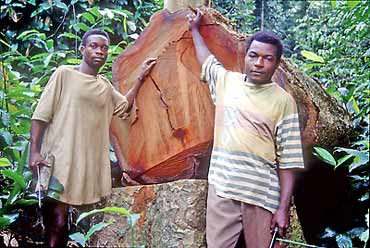


W. Maathai
Wangari Maathai, 2004 Nobel Peace Prize Laureate, is Assistant Minister for Environment and Natural Resources, Kenya, and Goodwill Ambassador for the Congo Basin Forest Ecosystems.
Wangari Maathai addresses the opening plenary session of COFO 2005 |
 |
FAO/I. BALDERI |
Investment in the protection and conservation of the environment is an investment in peace.
First of all, allow me to warmly congratulate the Director-General of FAO and his staff for organizing the meetings which we have attended here on international cooperation on sustainable forest management. I wish also to thank the host Government of the Republic of Italy for the support it continues to give to FAO and its leadership.
In early February, H.E. the President of the Republic of Congo, Mr Denis Sassou Nguesso, invited me to address the Second Central Africa Head of States Summit on Conservation and Sustainable Development of Forest Ecosystems. At that meeting, the heads of State appointed me a Goodwill Ambassador for the Congo Basin Forest Ecosystems.
In encouraging me to embrace this assignment, my President, the Hon. Mwai Kibaki, emphasized that the appointment was indeed an expression of the new spirit of African partnership. During his recent speech at the opening of the twenty-third session of the Governing Council of the United Nations Environment Programme (UNEP), he stated that “the only effective, way of addressing the challenges we face is to respond together as one community”. I gladly accepted this appointment which is challenging but extremely worth the time and effort.
The leaders of Africa, especially those from the Central African subregion, are committed to sustainable management of the Congo Basin ecosystem and reversing the loss of the rich local biodiversity. This is because this forest ecosystem is the second largest green lung (only second to the Amazon in its size and role). It comprises 200 million hectares (about 18 percent of the word’s tropical forests) and hosts about 400 mammalian species and more than 10 000 plant species. These species are threatened with extinction. Also threatened are the livelihoods of thousands of indigenous people who depend on the ecosystem. At the Brazzaville summit, the heads of State signed a treaty committing themselves and national resources to conserve and sustainably manage this heritage.
For me therefore, within weeks of my appointment in Brazzaville, it was a pleasure to accept an invitation by President Sassou Nguesso to accompany him to this FAO meeting and to join in the appeal to the world to support the heads of State of the Central African subregion, and indeed the entire African region in general, to save, protect and conserve the Congo Basin forest ecosystem. This beautiful city of Rome, which is the headquarters of FAO, a UN agency which has championed conservation of forests, is the right place to bring this appeal.
The importance of forests for the ecological balance of the planet earth is well known. It includes the capacity to absorb carbon, to combat desertification, to offer safeguards against flooding and erosion, to serve as a reservoir of genetic resources, to provide wealth and to provide water catchment areas. None of us can claim ignorance. We all know.
In the past there has been much talking and consulting but little action. Already three decades ago, another generation of African leaders was urging a newly created UNEP in Nairobi to save forests. In his speech during the inauguration of UNEP in 1973, President Jomo Kenyatta of Kenya said, “Nature has blessed us with her many gifts of forests, grasslands and rivers. Man has often destroyed and abused them through misuse and neglect. Wide belts of forests have disappeared”. We have known that our forests are under threat for many years!
Yet the environment continues to be degraded even as we meet, talk, consult and create strategic plans. In the final analysis it is the decisions by political leaders that will provide the resources needed to save the environment. If political leaders decide to engage only in talk but never to commit resources, the forces of environmental destruction may overcome the efforts made by individual citizens, organizations and companies.
It is for this reason that I have been greatly encouraged by the initiatives taken by the heads of State of the Central African subregion towards the Congo forest ecosystem. They have for example taken the following steps, which should serve as a source of inspiration to this meeting:
On its part FAO has also played an active role in support of the Conference of Ministers in Charge of Forests in Central Africa (COMIFAC) and in the development and revision of the Convergence Plan, and has been very active in Central African countries in various projects related to forest management, forest conservation and capacity building. This type of partnership needs not more discussions and consultations, but intensification, expansion, resources and skills.
Despite the talk, consultations and strategic plans, the Central African environment continues to be degraded |
 |
FAO/CFU000206/R. FAIDUTTI |
The estimate for the implementation of the Convergence Plan calls for €1.3 billion for a period of ten years, spread over 11 countries within the subregion. Such an amount may be argued to be a lot of money, but is it really? Not if it is used to save such as an exceptional ecosystem, whose destruction would have a devastating impact on the global climate, agriculture, energy source and water system both for the people who live in the subregion and for the entire planet. It was in recognition of the importance of this ecosystem that the United Nations General Assembly adopted Resolution 54/214 of February 2000.1
Those of us who still think that €1.3 billion is too much money should compare it with the alleged (and I stand to be corrected) €300 billion of subsidies for agriculture per year within the European Union! Further, consider the amount being invested in wars. Yet many wars and conflicts, including those being fought within the region, are being waged over access to and control of resources.
In my opinion, investing in the protection and conservation of the environment, including the Congo Basin ecosystem, would be preempting future conflicts and instead investing in peace. This is the message that the Norwegian Nobel Committee sent to the world when it awarded the 2004 prize to me. We must rethink peace and security and promote activities that promote cultures of peace.
Protecting the forest ecosystem of the Central African countries would be directly addressing the UN Millennium Development Goals (MDGs), especially Goal 1, “Eradicate extreme poverty and hunger”, and Goal 7, “Ensure environmental sustainability”. Indeed, failure to protect forest ecosystems and to promote forest economies is a sure way of not realizing MDGs.
Recently, when the tsunami tragedy hit the countries of the Indian ocean the world responded with unprecedented compassion and generosity. It was a great show of the best of humanity and everyone was deeply touched and grateful. We witnessed the power of the waves and saw our own vulnerability against such natural phenomena.
It has been said that there are many silent tsunamis in Africa and in them many lives are lost. Yet they pass completely unnoticed except by the victims and their families. Why is it that the same humanity that responded so passionately to the killer waves in the Indian Ocean responds so nonchalantly to the silent tsunamis in Africa? We seem to accept them as the face of Africa, something expected, natural to the region. We document it, broadcast it and comment about it. Yet we take no action. Why is that?
Many conflicts are waged over access to and control of resources – investing in the protection and conservation of the environment, including the Congo Basin ecosystem, would be an investment in peace |
 |
FAO/19151/M. MARZOT |
During the Jubilee 2000 campaign, many governments who were owed money by poor developing countries, a good number of them in Africa, argued that they would not cancel the debts because it would not be the poor people, in whose name the campaign was waged, who would benefit from such cancellation. Rather, it would be the corrupt ruling élite, who had misappropriated the money to begin with. Therefore, corruption, lack of accountability, transparency and efficiency justified non-cancellation of debts.
I bring this issue of governance up front because I know that it is a bone of contention among development partners. For almost a decade now there has been a new level of consciousness and commitment to good governance in Africa. Many African leaders deliberately pursue democratic principles, accountability, transparency and efficiency.
That is partly why leaders in the Central African subregion recommend that upon the cancellation of debts, resources made available for conservation be placed in a trust fund, to be managed by representatives of governments, development partners and members of the private sector and civil society; and also having monitoring procedures to guarantee the adequate use of the debt conversion for conservation projects. We would like to request that FAO and other multilateral partners such as the Global Environment Facility, the World Bank, the African Development Bank, UNEP and the European Union support this venture and help us to set up this trust fund. To ensure that there is accountability, transparency and efficiency, the regulations governing this trust fund should be formulated by all the partners involved.
Some developed countries have demonstrated confidence in the leadership in Africa and have cancelled debts. We express our gratitude to the Government of Italy, which has paved the way by cancelling its bilateral debt with all the Central African countries to assist them in the implementation of the Convergence Plan. Other G8 members have recommended new ways to finance development in Africa. We should all be very grateful for the discussion and consultations that are currently going on. We do hope that the G8 leaders will agree on some action, including the conservation of African forests in general but the Congo Basin forest ecosystem in particular.
FAO and other UN agencies can assist by providing expertise and assistance to identify resources for the Congo Basin forest ecosystem. For this reason, we strongly believe that FAO should play an instrumental role in the implementation of the Convergence Plan for the Conservation and Sustainable Management of Forest Ecosystems in Central Africa.
Distinguished delegates, one Goodwill Ambassador is not enough for the Congo Basin forest ecosystem. Join me in this effort. I call on you to be our ambassadors for this ecosystem.
In Brazzaville, during the second Summit of Heads of State, I recalled the words of President Kennedy and urged participants not to ask what the Congo Basin forest ecosystem could give them, but rather to ask what they could do for the ecosystem. Indeed I reminded them that the Congo Basin does not need us. Rather, it is we who need the resources of the basin. If only we could take some action. If only we could stop the talk and walk.
We owe it to the present and future generations. Merci beaucoup. Thank you.
1 Resolution 54/214, on the “conservation and sustainable development of Central African forest ecosystems”, invited the international community to support the countries of Central Africa in efforts to sustain the forest ecosystem, including through the provision of financial and technical assistance on a regional basis.